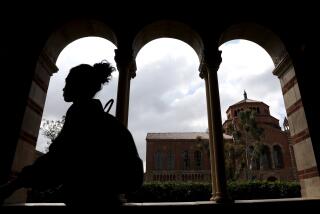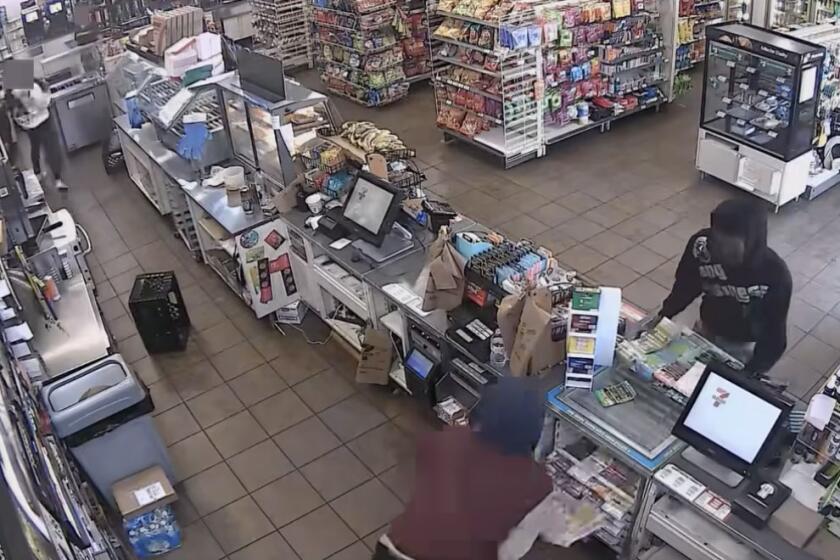Haunted by campus misdeeds
I wasn’t surprised by the blow-back from readers upset that my column last week endorsed the wholesale transfer of employees from Miramonte, the Los Angeles elementary school embroiled in a sex abuse scandal.
Teachers from other schools emailed to complain that the Miramonte staff is being scapegoated for something they could not have known: what went on behind the closed doors of a third-grade classroom, where teacher Mark Berndt allegedly spoon-fed semen to blindfolded students.
“These teachers will forever be branded or stigmatized by this incident and are innocent bystanders,” wrote Larry Mizrahi, a former teacher.
He accused L.A. Unified Supt. John Deasy of “throwing out the baby with the bath water.” Others called it a “witch hunt,” a sop to hysteria, a knee-jerk example of “cover your butt.”
I expected a strong reaction from teachers, who might imagine themselves in their colleagues’ shoes.
What I didn’t expect were their horror stories about less sensational campus misdeeds.
Teachers apparently know when something is not quite right with a colleague. But they don’t always know what to make of what they see, or what to do about what they hear.
No one used the words “culture of silence,” as Deasy has characterized Miramonte. And no one described anything resembling the allegations that have landed Berndt behind bars.
But the teachers I heard from described private struggles to separate rumors from facts, and lunchroom confrontations that divided teaching staffs. Some saw problem teachers transferred; others said complaints to principals vanished.
“We all need to keep our eyes and ears open,” wrote Lynne Murphy, who described herself as “an LAUSD inner city teacher who agrees with much of what you said.... We need a better picture of what was going on and why it continued.
“Predators will always work in jobs where there is access to children.”
::
For retired teacher Nena Lefitz, the Miramonte saga resurrected grim memories from her early years as a substitute with L.A. Unified.
“I saw things that kept me awake at night,” she wrote.
On one long-term assignment, “One of my students went to the teacher in the next room” for a special education program, she recalled. “The teacher opened the adjoining door, had my child by the hair and threw him into my class, telling me to keep him. She didn’t want him.”
The teacher later became a principal, Lefitz said.
That explains why complaints about teacher misconduct can reach a principal and go nowhere.
In another school, on a one-day job, “the teacher in the next room threw a child from her class into mine. There was masking tape on his mouth,” Lefitz said. She removed the tape and let the child stay. But she didn’t tell anyone about it that day.
“I have other stories,” she said — most, like these, more than 30 years old. “I used to come home with stomachaches, some teachers were so bad. I still rue that at the time, I did nothing about them.”
Later, when she had a permanent spot at a school in Van Nuys, she didn’t hesitate to complain when she saw a teacher exercise bad judgment. “I had a principal that I believed would speak with them and keep an eye on them,” she said.
If you’re considering breaking ranks to report a colleague, it helps to know that the limb you’re going out on isn’t about to be sawed off.
A good principal encourages that kind of openness. “They like to know what’s going on,” said Linda Linville, a history teacher who retired three years ago from Centennial High in the Corona-Norco Unified School District.
Her principal, Dale Mitchell, was “a nice guy, but he wasn’t afraid of conflict,” she said. He’d walk the campus and pop into classrooms unannounced. “He cut off a lot of trouble because he kept his ear to the ground.”
Linville also worked for “bad principals, [who] don’t want to deal with controversy and conflict, so they avoid handling problems.
“We’re always talking about evaluating teachers,” she told me in an interview. “But after 35 years, I still don’t know: How are we evaluating principals?”
::
Miramonte’s principal, Martin Sandoval, had been at the school for only two years. He got high marks for raising test scores, engaging students and improving parent involvement. But he obviously inherited serious problems.
Berndt taught at Miramonte for three decades; complaints about him go back almost 20 years. But allegations of misconduct can be lost, a principal told me, “unless there’s a paper trail and the departing principal says to the new one, ‘Watch this guy.’”
In a giant district like L.A. Unified, with more than 664,000 students, there are plenty of teachers who need watching — and I don’t mean just the criminally bad, the abusers and the pedophiles.
That’s why Deasy’s investigation has to go beyond Miramonte. What puts kids at risk, day in and day out, are the cruel, the uncaring, the incompetent.
“Every school has some and everybody knows it,” one teacher wrote.
Terry Bartholome was one of those. He’s the teacher I wrote about last week, who was convicted 25 years ago of molesting 13 third-grade girls.
Lefitz, the retired San Fernando Valley teacher, crossed paths with Bartholome more than once. Her son had him as a teacher in Woodland Hills 40 years ago, before Bartholome was transferred for making anti-Semitic remarks.
Later, Lefitz wound up subbing for him at a campus in Canoga Park. “I walked into his fifth-grade class, and there was no lesson plan,” she recalled. “I asked the children where they were in the math book. They told me that Mr. Bartholome let them work at their own pace, and once the book was done he would check it.
“There was no math instruction,” she said. “He didn’t last long at that school, but he was transferred to a school in South-Central Los Angeles.”
And when parents there complained, Bartholome was transferred again — to an elementary school nearby, where he was eventually arrested.
L.A. Unified veterans have a name for that practice: Pass the trash, they call it.
Should they have known that he was a child molester? Probably not.
Should they have known that he was a rotten teacher? Definitely yes.
More to Read
Start your day right
Sign up for Essential California for news, features and recommendations from the L.A. Times and beyond in your inbox six days a week.
You may occasionally receive promotional content from the Los Angeles Times.






